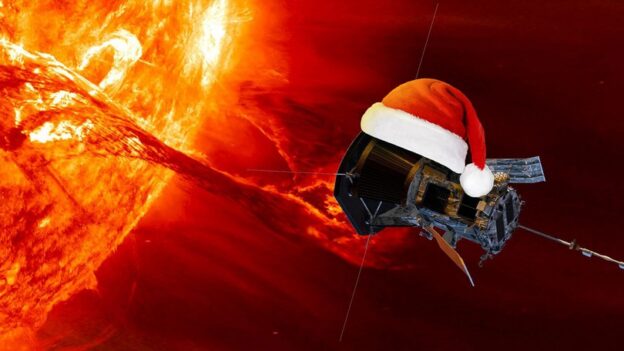On Christmas Eve the Parker Solar Probe is going to enter the Sun’s atmosphere for the first time to study Solar Wind. For radio hobbists of all ilks, this will hopefully help us understand more about the origins of Solar Wind, and thereby help us understand more fully the effects this has on radio signals (and other space weather issues).
The following is an exerpt from an article on ARS Technica by Eric Berger
Almost no one ever writes about the Parker Solar Probe anymore.
Sure, the spacecraft got some attention when it launched. It is, after all, the fastest moving object that humans have ever built. At its maximum speed, goosed by the gravitational pull of the Sun, the probe reaches a velocity of 430,000 miles per hour, or more than one-sixth of 1 percent the speed of light. That kind of speed would get you from New York City to Tokyo in less than a minute.
And the Parker Solar Probe also has the distinction of being the first NASA spacecraft named after a living person. At the time of its launch, in August 2018, physicist Eugene Parker was 91 years old.
But in the six years since the probe has been zipping through outer space and flying by the Sun? Not so much. Let’s face it, the astrophysical properties of the Sun and its complicated structure are not something that most people think about on a daily basis.
However, the smallish probe—it masses less than a metric ton, and its scientific payload is only about 110 pounds (50 kg)—is about to make its star turn. Quite literally. On Christmas Eve, the Parker Solar Probe will make its closest approach yet to the Sun. It will come within just 3.8 million miles (6.1 million km) of the solar surface, flying into the solar atmosphere for the first time.
Read the whole article here
Posted by Robert Gulley K4PKM


For those of us outside of the USA Liberia and Myanmar, that is around 700,000 km/h
A fact little-known on the internet: Myanmar is fairly metricised – speed limits are in km/h, fuel is sold in litres, items in supermarkets are sold by L or mL, kg or g, etc. (though in markets it’s not unusual to see traditional Burmese units used), etc.
Never been to Liberia, but I understand at least speed and distance signs are frequently in km/h or km.
AFAIK, it’s really only the USA and UK that commonly use miles.
> Let’s face it, the astrophysical properties of the Sun and its complicated structure are not something that most people think about on a daily basis.
WHAT???
Ha! I guess proving once again, radio folks aren’t most people, thankfully!!
Cheers! Robert
And of course, need to reference Pink Floyd’s “Set the controls for the heart of the sun” 😉
I had no idea, Robert! Thank you for publishing this!
-Thomas
Wow!
Thanks for posting that, Robert!
Cheers — and Merry Christmas — Jock
Merry Christmas Jock – I hope you and yours have a truly blessed Christmas!